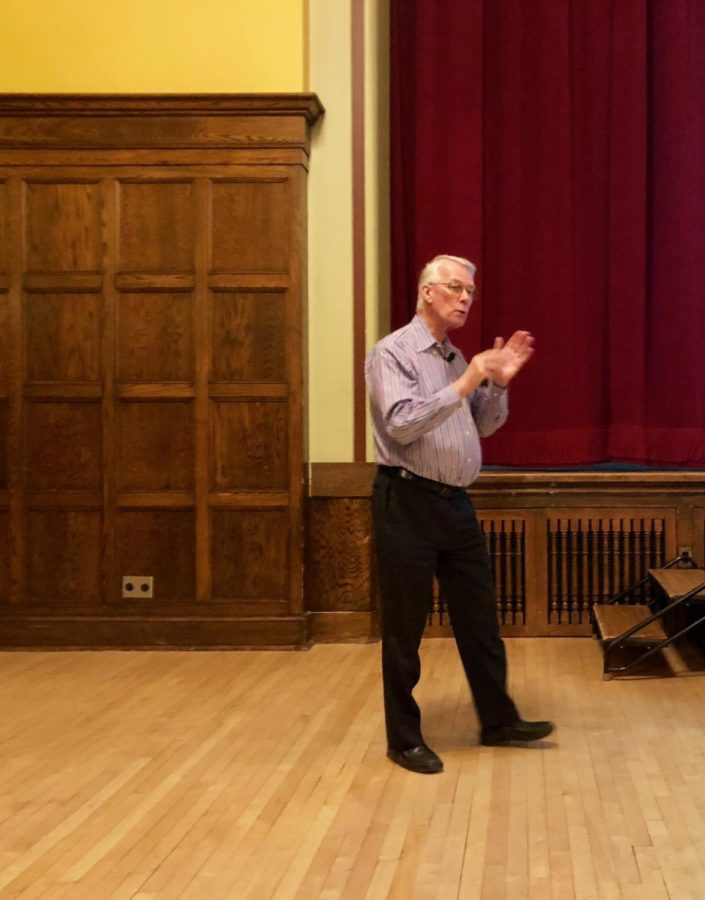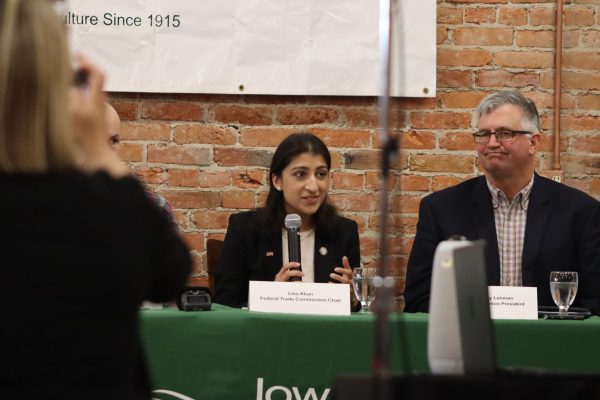Nobel laureate discussed support of genetically modified organisms
January 21, 2020
Sir Richard Roberts discussed the importance of accepting genetically modified organisms as a viable food source Tuesday.
Roberts spoke in the Great Hall of the Memorial Union for “The Nobel Laureates’ Campaign to Support GMOs” lecture.
Roberts was a co-recipient of the Nobel Prize in Physiology or Medicine in 1993 for the discovery of gene splicing. Roberts’ education includes a bachelor’s degree in chemistry and a doctorate in chemistry from the University of Sheffield in the United Kingdom.
With 151 Nobel laureates, Roberts works to de-stigmatize the use of genetically modified organisms.
“I feel rather strongly that the GMO approach to plant breeding has many advantages,” Roberts said. “They can speed up the new generation of new plants, new species that will feed the world.”
Roberts said there are 800 million people going hungry across the world and the adoption of GMOs to farming practices can help feed developing countries.
Humans have been changing crops over centuries through hybrid breeding to improve food sources, and according to Roberts, genetically modifying crops allows scientists to improve breeds further over a shorter time, creating new breeds in only several years.
“You might ask why Europe doesn’t embrace the GMO approach,” Roberts said. “They don’t need it, but it can help in developing countries, and most Europeans really care about the developing countries.”
Roberts said Europeans did not want U.S. companies like Monsanto to control food supply in Europe. Monsanto developed genetically modified food which made money for the company and farmers, but expected consumers to pay more for the product, creating a backlash.
“Immediately, Greenpeace, led by Patrick Moore at the time, decided this was the way to get at Monsanto,” Roberts said.
Roberts said Greenpeace declared genetically modified organisms are dangerous and dissuaded Europe from purchasing genetically modified products. Since Europe is a developed country, they are not reliant on genetically modified products and the campaign worked, leaving Greenpeace with increased funding.
Roberts said this influence impacts developing countries and dissuades them from a practice that could increase crop yield and save lives.
Vitamin A deficiency impacts developing countries that could have been minimized through the genetically modified crop, golden rice; however, efforts from Greenpeace have delayed its implementation Roberts said.
“Since 2005, millions of children have died because they didn’t get enough Vitamin A,” Roberts said. “My question is, ‘how many have to die before we consider this a crime against humanity?’”
Roberts said Greenpeace, an international non-governmental organization, is using misinformation to influence populations and governments away from genetically modified crops.
“It’s not how something is made that’s what is important, but rather, what is the nature of the product,” Roberts said.
During a question and answer segment following the lecture John Norwood, a soil and water commissioner for Polk County, shared his observations.
Norwood said there have been instances in history where products were thought to be safe, but ended up creating unintended consequences, such as thalidomide, a drug used to treat nausea that when given to pregnant women, damaged fetuses in the middle of the 20th century.
“We remove one stick, and it causes a reaction that throws the system out of balance, and we don’t know what that is until, sometimes, after the fact,” Norwood said.
Tina Dang, senior in genetics, attended the lecture and said she is in favor of genetically modified organisms to increase food production.
Dang said an impactful statement Roberts’ made was how choosing to abstain from genetically modified organisms may be a luxury in developed countries, but it is a need in developing countries.
Dang said the case studies of how genetically modified organisms can help developing countries in Roberts’ presentation provided insight.
“This summer I went to Uganda and actually saw the lack of food firsthand,” Dang said. “So this is honestly kind of personal to me.”

















